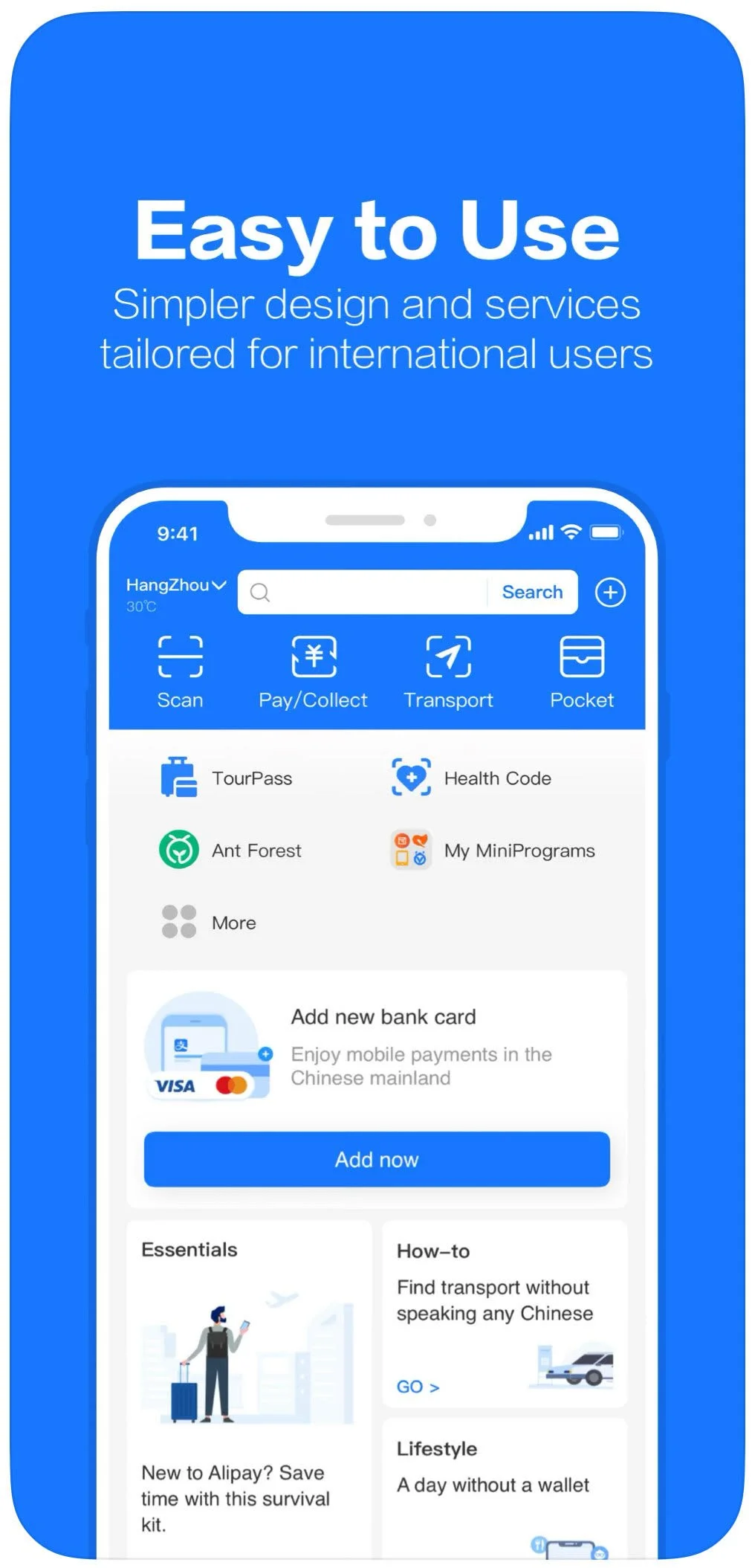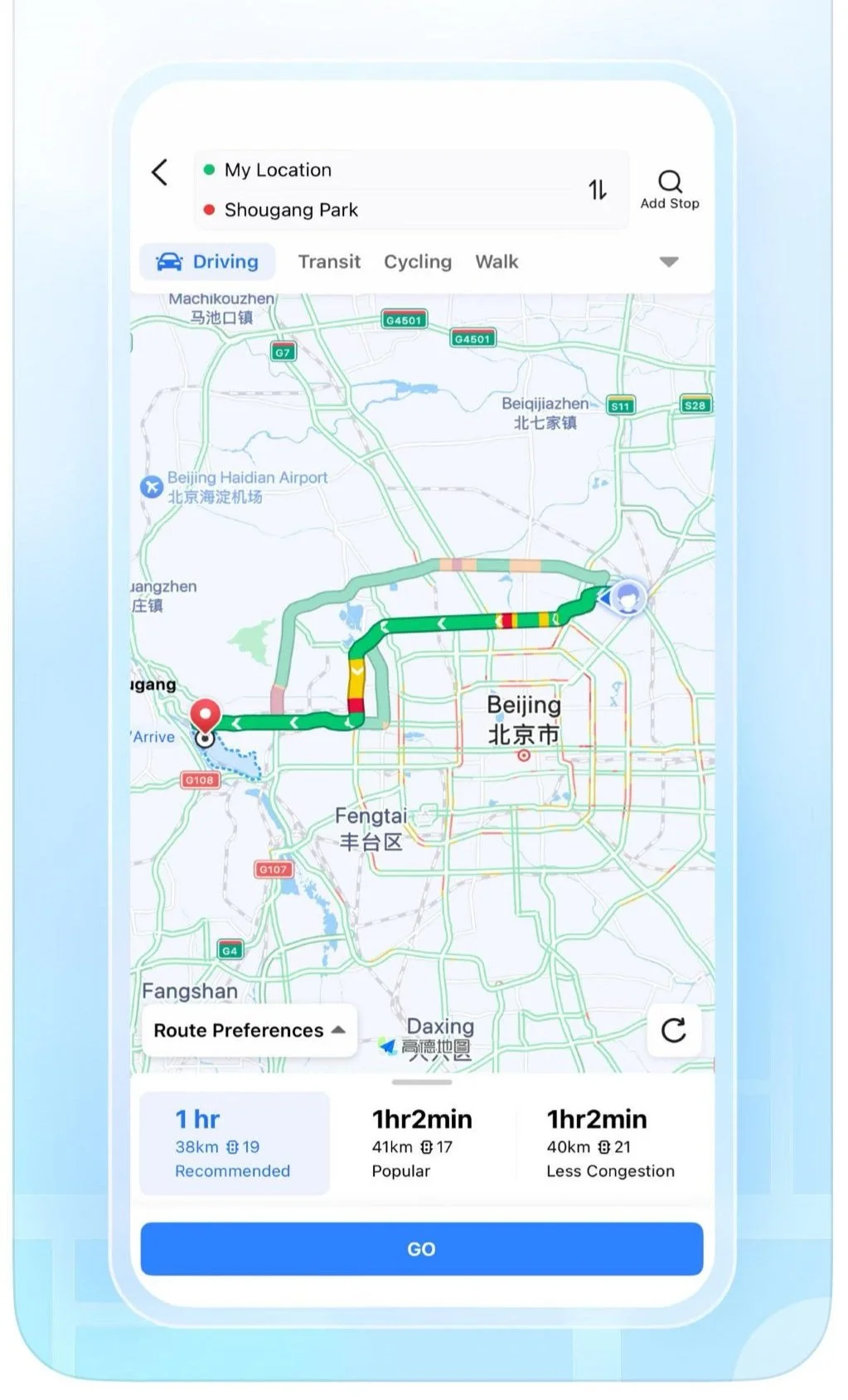What Apps Do You Really Need As A Tourist In China? Super-Apps and Mini-Programs Unpacked (2026)
Contents
Introduction
General Differences
Can I use any of my usual apps?
Does that mean you need to download a million apps to get the full travel experience, just for China?
Which apps do you really need to download if you’re visiting China?
What is the Chinese version of this app?
What about functions not mentioned above? Don’t you have to download a separate app?
How to use a Mini-Program?
Can I travel without using any Chinese apps? What is the reality?
Introduction
China has an app ecosystem that is unknown by most people outside of China, except for the most popular apps. There is a Chinese app equivalent for everything you can think of.
General Differences
Homepages are typically loaded with a variety of functions which may give a crowded appearance VS the mostly minimalistic designs in Western apps.
If you are new to Chinese apps, you may find it overwhelming at first. The main benefit of packing these functions onto the homepage is that after you become familiar with the app, it is easy to find what you need.
All apps are designed with Chinese characters in mind so you might notice a more boxy type design.
Chinese mobile apps are almost always superior to their desktop versions (which don’t even exist for some platforms).
Can I use any of my usual apps?
Most of the Western apps either do not work at all or are not as good as the Chinese app for that particular function. These are some of the apps that are both relevant and usable:
Apple Maps works only after you arrive in China, but last time I checked, some of the information was not as up-to-date as the Chinese apps like Amap.
Booking has many Chinese hotels, but Chinese platforms like Trip have a larger range to choose from. The prices are always cheaper for me. Compare the prices, there’s no harm in doing it!
Google Translate works as long as you’re using an eSIM or VPN, or you downloaded the offline language pack.
What does that mean for you if you’re visiting China?
Does that mean you need to download a million apps to get the full travel experience, just for China?
Is it gonna to take a lot of your time to understand each of these apps?
Not as much as you think. This is one of the biggest misunderstandings that overwhelms visitors to China, and you often see conflicting information. Keep reading.
Which apps do you really need to download if you’re visiting China?
YenKid: I’ve gotta emphasise. There is absolutely no need to download a million apps. I understand that you’ve never been to China and you want to be prepared.
But for most travel purposes, you just need a couple of super-apps - mainly Alipay and WeChat + a couple of speciality apps - Trip and Amap. Oh, and MetroMan has the best metro maps that I’ve seen, but it’s not compulsory. Also a translation app and VPN if you aren’t getting an eSIM - see my guide on this topic.
➡️ If you get Alipay working (seems to work for nearly everyone I know), WeChat is not absolutely critical. But it’s good as a backup and to communicate with hotel staff.
This is the setup I recommend to friends if they’re only visiting for a week or less. If you’ve visiting for longer, you can consider additional apps, but they’re still not compulsory. Most other apps can be accessed as integrated mini-programs through Alipay and WeChat.
What is the Chinese version of this app?
(This list considers apps most useful for foreign tourists, in my opinion. Alternative Chinese apps are available in most cases.)
Alipay = PayPal + Transport Card + Uber + Bike Sharing + DoorDash + more
-> payment, metro card, hail a cab, rent a bike, ordering takeout
WeChat = WhatsApp + PayPal + Transport Card + Uber + more
-> instant messaging + similar functions to Alipay (a backup in case Alipay isn’t working)
Trip = Booking + Train Tickets + more
-> hotels, flights, train tickets, tickets to attractions
Amap = Google Maps
-> navigating the city
See my app finder to find the best app for a particular function in China.
See my setup and payment guide for Alipay and WeChat for a step by step guide for these apps.
YenKid: If you want to go bare minimum, Alipay + Amap. WeChat has similar essential functions to Alipay, but you can message people. Trip can be accessed through Alipay - it’s just not as user-friendly as the standalone app.
What about functions not mentioned above? Don’t you have to download a separate app?
I had the same thought and assumed I had to download 10-20 new apps, since I was living outside of China after the app revolution happened. But nope.
There is a quick solution to this called mini-programs. You can access most of these specialised mini-programs inside Alipay and WeChat. You DON’T need to install them separately.
I must emphasise that WeChat generally has a larger range of mini-programs. So, use WeChat if you can’t find it on Alipay. That’s why they’re called “super-apps”. Alipay and WeChat are two of the most useful apps in the world, in my opinion.
On a single app, you can make payments, hail a taxi, rent a bike, ride the metro, buy tickets to many attractions, book hotels, book train tickets, order food delivery, shop online. Without downloading another app.
Some mini-programs might not be that user-friendly. It’s usable though. Downloading the separate app often offers a better user interface and additional functionalities. For some apps like Trip, I prefer to have a separate app, because I use it frequently and the user interface is better on that version.
YenKid: Use the inbuilt mini-program in Alipay or WeChat if available. Download the separate app only if not available.
How to use a Mini-Program?
For Alipay, the most popular mini-programs (e.g. Takeout, DiDi, Taobao) are shown on the homepage. For additional apps, you can use the search function if you know the name of the app.
For WeChat, you will need to drag down on the homepage and click the search function in the top corner. Chinese pinyin should be okay for popular apps.
Here’s the Chinese characters for 3 popular apps: 美团外卖 Meituan Waimai (food delivery app) + 饿了么 Eleme (food delivery app) + 滴滴 DiDi (hail a cab).
There are sometimes multiple mini-programs with similar names - choose another one if the first one shows something unexpected.
Use the in-built translation function to translate everything into English. There are some funny translations though, at least it will amuse you!
Can I travel without using any Chinese apps? What is the reality?
It is still technically possible to travel in China without using apps on a day-to-day basis, but it could cause quite a lot of inconvenience for you as an independent traveller. And you’ll definitely spend more money because some businesses will not have any change to give you (as virtually everyone uses digital payment).
You won’t be able to use DiDi (the equivalent of Uber) in most cases. Many attractions require online advance bookings. App prices for food and drink are sometimes discounted compared to the in-store price. I certainly don’t recommend going app-free, because you won’t have the best possible experience.
Of course, you will get some people (both online and offline) telling you using apps is the only way and insisting you use the app (because you look young and therefore adept with technology!) I totally get it.
But if you think about it, a lot of elderly people in China still don’t know how to use apps.
All offline businesses are legally required to accept cash payments and many attractions offer on-the day purchasing. You could even ask your hotel or pop into a local travel agent and ask them to reserve tickets for you. Most restaurants will have paper menus.
You just need to ask and explain you don’t have the app. If for some reason, my grandma was travelling by herself, she would be able to manage. If you’re on an organised tour for the whole trip, you may even find that apps aren’t that necessary. So that’s something for you to decide.
My conclusion ➡️ I still strongly recommend Chinese apps - even installing the bare minimum will make a huge difference!
BUT
if you insist, you can survive without apps as long as you have cash. No one hates money, but many find Alipay or WeChat more convenient. Just explain you don’t have Alipay or WeChat. Providing you can accept that your experience will not be as smooth as having access to online apps AND you will spend more time and money.
Note: If you’re travelling with family, it is not essential for everyone to use their own app, but there are certain things like the digital metro card that can only used by one person. For ordering food, hailing a taxi, booking tickets, you can normally only need one person to place the order. Obviously the person with the app will have to pay for everything.
Final word ➡️ That’s all, I hope you feel more confident about visiting China. It really isn’t as complicated as most people think. Hope you enjoy the fascinating world of apps in China.
CHECK OUT RELATED ARTICLES BY ME 👇🏻
How To Make Payments As A Tourist in China: A Beginner's Guide (2025)
How to Buy Tickets to Attractions in China (2025 Guide)
Do I Need a Local SIM Card or VPN When Travelling in China? (2025 Guide)
16 Misconceptions and Mistakes All First Time Visitors Must Know!
How to Get Around and Use Public Transport in China: Beginner's Guide (2025)
How to Ride the Metro in China: Ultimate Guide to Getting Around the City (2025)
How to Rent a Bike in China (2025 Guide)
How to Hail a DiDi Driver in China (2025 Guide)
Essential Things To Know About Trains and High Speed Rail in China (2025 Guide)
How to Order Food Delivery in China - A Simplified Guide
How to Order Food and Drink in China? A Mini-Guide with Key Phrases (2025)
START PREPARING FOR YOUR TRIP NOW! 🐼
✈️ Book your flights to China here
🛏️ Book your hotel in China here (promo code for new users)
🚅 Book your train in China here (promo code for new users)
🎫 Book your tickets for China here (promo code for new users)
🎫 Purchase your China eSIM here
Embedded video credited to the unaffiliated YouTube channel "How To Do? In China" in accordance with YouTube's fair use policy.

